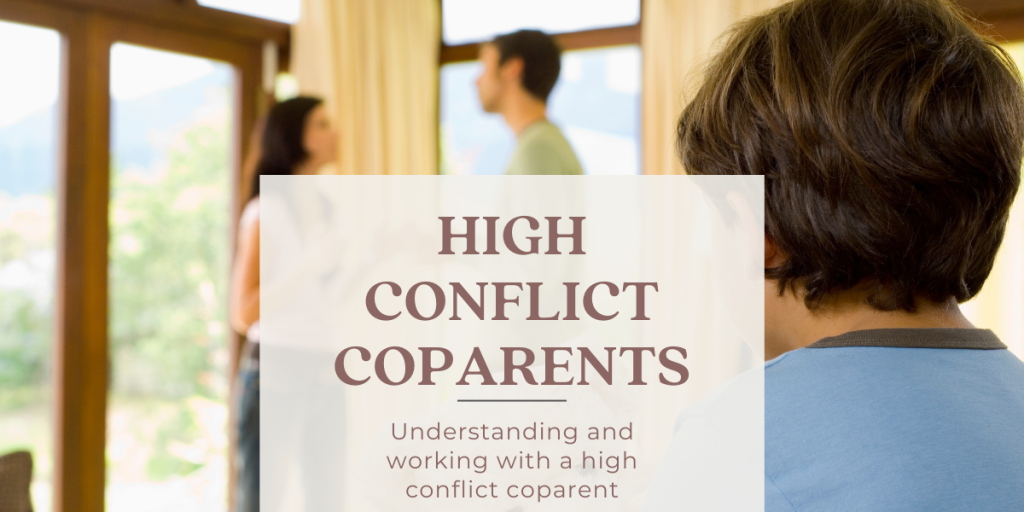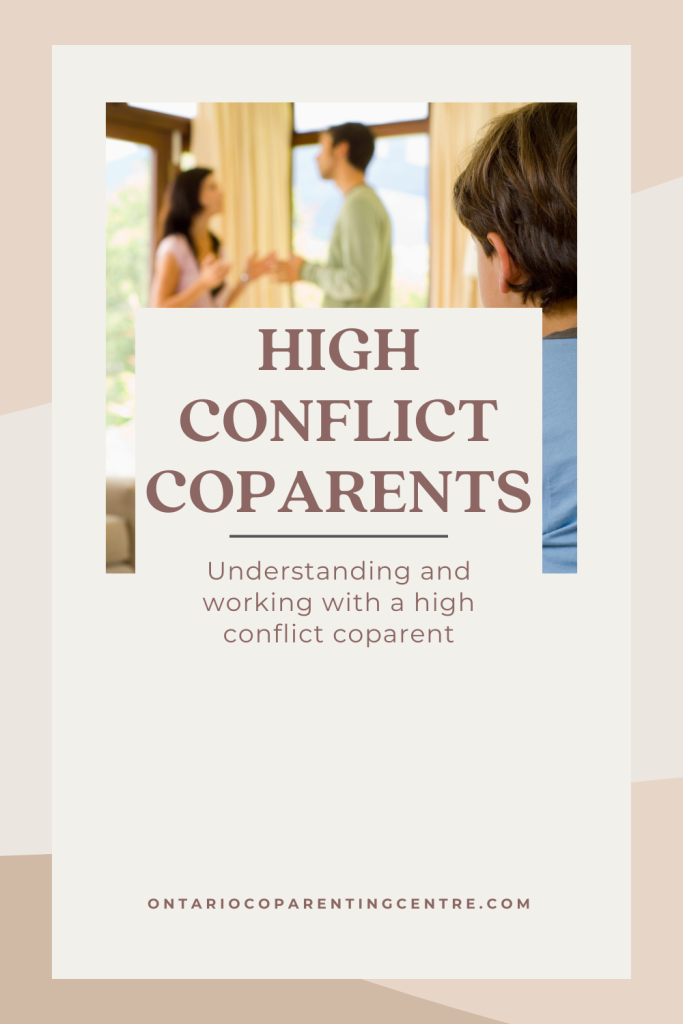
Parenting with a high conflict coparent can be really difficult. You may feel constantly criticized, under attack, and that the drama and conflict will never end. Although you can’t change your child’s other parent, you can adopt strategies to change the way you understand and relate to the high conflict coparent, and to help yourself feel calm, safe, and resist from engaging in their drama.
UNDERSTAND THAT HIGH CONFLICT PEOPLE ARE DIFFERENT
Bill Eddy, founder of The High Conflict Institute provides an excellent and on point description of high conflict people:
“High conflict people (HCPs) have a pattern of high-conflict behavior that increases conflict rather than reducing or resolving it. This pattern usually happens over and over again in many different situations with many different people. The issue that seems in conflict at the time is not what is increasing the conflict. The “issue” is the high-conflict personality and how the person approaches problem-solving. With HCPs, the pattern of behavior includes a lot of:
- Blaming others
- All or nothing thinking
- Unmanaged emotions
- Extreme behaviours”
“https://www.highconflictinstitute.com/hci-articles/who-are-high-conflict-people”
High conflict people are rarely capable of self-reflection. As such, it’s very important that you DO NOT tell someone who is high conflict that you or others think they are high conflict. This will only make things worse. The best thing to do is learn to manage your responses and reactions, avoid engaging in conflict, and keep interactions to a minimum.
COMMUNICATING WITH A HIGH CONFLICT COPARENT
Most importantly, stick to emails rather than phone calls or texting. It’s too easy to lose what you’re talking about or stay on topic. If your coparent is high conflict, you need a written record of what has been agreed on, because they will often say they did not agree to whatever is being discussed. Email also allows you time to slow things down in a way that text messaging does not since we tend to reply to texts immediately. It also helps to have an email specifically to communicate with the high conflict coparent so that their emails are separate from your regular life. No need for the drama-llama to be part of your regular inbox. (Don’t forget to check it daily!)
When your child’s other parent sends accusatory, demanding, critical, or attacking emails, it’s easy to fire off an emotional or impulsive response and defend yourself. Or worse. Counter attack. The only thing this accomplishes is to fuel unnecessary drama and conflict.
In order to decrease conflict, it’s vital to understand that nothing you say or write will change the past, or the other parent’s personality. High conflict people don’t understand or believe that they are high conflict. They do not take responsibility for anything, and they generally do not change without significant and long term therapeutic interventions. If they change at all.
You are communicating with your coparent for one reason only. You need to share information about your kiddos. When writing your emails, keep these guidelines in mind:
- BE CONCISE- Share facts only. Stop sharing your opinions, defending yourself, or over-explaining. That just encourages more conflict. Too many details, lengthy explanations, and sharing your feelings will give the high conflict person more to be angry about and to attack you for. Keep it tight.
- KEEP IT SHORT- Communicate about one topic per email. Do not digress or reference any other subject and don’t allow yourself to respond to anything off topic.
- USE A NEUTRAL TONE– Pleasant if you can manage, neutral if not. Write like you’re emailing your bosses boss.
- BE FIRM BUT KIND- Do not over explain yourself, or engage in a long negotiation, or send multiple emails defending yourself. Stay child focussed. Avoid trying to convince them to change their position or that you may be right. That just invites more opportunity for them to attack.
This keeps your emails short, friendly, and on topic.
THE “BIFF METHOD”
Bill Eddy, created the BIFF method and it works well in any circumstances when you’re dealing with a high conflict person, whether they are a coparent, relative, friend, or at work.
- BRIEF- All responses to emails should be brief and focus on answering the question. If the email is just criticism and ranting, no answer is required. Don’t take their statements personally, and don’t respond with a personal attack or defend yourself. Stay on topic and keep it short. Do not explain, just inform.
- INFORMATIVE- Focus on your statement and ignore their allegations, tone, criticism etc. Avoid correcting and defending yourself, negative comments, or sarcasm. Stick to one or two sentences that clearly states what information you are seeking or sharing.
- FRIENDLY- Think about a friendly response rather than responding in anger or defensiveness. Be relaxed and non-provoking. If you are emotional, take some time before replying. If you think it’s appropriate, you can say you recognize their concerns and or understand. If not, then just keep the tone of the email polite and neutral.
- FIRM- Share your position or information in a polite manner, and do not make any further comments that will only invite more conflict. If you need an answer or you’re trying to negotiate an issue, in a non-threatening way clearly tell the other person your information or position on an issue. Avoid saying things like “I hope that’s okay” or “I hope we can agree.” They won’t. They are there for the conflict. If the issue has been addressed, ignore any further responses. If you have to respond to further emails on the same topic, keep it even shorter and do not emotionally engage. You can use the same words to repeat the previous information.
It also helps to take time to consider whether or not you need to respond immediately, or if you need to reply at all. You can always slow things down and take time where appropriate. This helps avoid engaging in the conflict and allows time for your emotions to settle. You don’t need to answer emails immediately, or all day long
LONG TERM STRATEGIES FOR DEALING WITH A HIGH CONFLICT COPARENT
RADICAL ACCEPTANCE
Trying to change the other person, or constantly trying to accommodate someone who is high conflict is a recipe for disaster and angst. Accept that you are dealing with someone who is high conflict. Nothing you do or say will cause them to “see the light,” change who they are, or turn them into a reasonable person. Accepting reality will enable you to focus on the choices actually available to you, as well as your own mental health and well-being.
MANAGE YOUR OWN EMOTIONS
If you emotionally react to your high conflict coparent’s drama, criticism, and constant nit-picking, you’ll make yourself crazy and invite more drama. Acknowledge the discomfort or anger you feel, and observe the feeling while you decide how best to respond. It never helps to fire off an email or quick response when you’re emotional. Utilize your coping skills to learn how to sit with the discomfort, and respond from a calm(er) place. And to repeat… if there is nothing to respond to in terms of a question to answer or information to share, you don’t need to respond at all.
DON’T TAKE THEM OR THE THINGS THEY SAY PERSONALLY
High conflict people need someone to blame and it will never be them. Although it’s hard, you cannot take their insults and criticism personally. It’s tough to remember this when you’re in the middle of things and your kiddos are involved, but most high conflict people’s behaviour has little to do with you. They have very distorted views and interpretations of reality. This is a reflection of who they are and how they function, rather than anything you have done or said. Remind yourself frequently that their need for drama and conflict is not your responsibility.
WANT MORE HELP WITH COPARENTING?
If you’re in Ontario and want some help managing a high conflict coparent, email us at jhill@ontariocoparentingcentre.com or southernontariocounselling@gmail.com or call us at 548-688-1310.
We’re available in person or virtually. If you have benefits that cover counselling, your sessions may be fully reimbursable.

